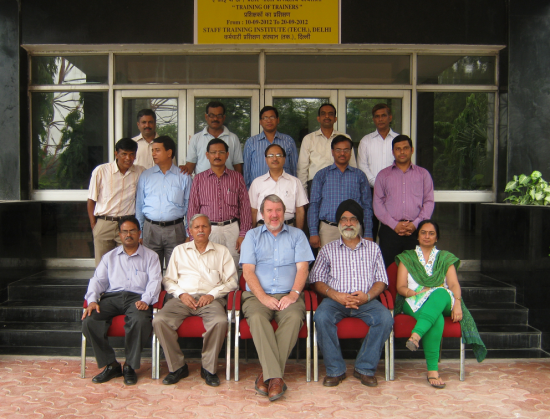How do you design a training course on transmitter maintenance? An engaging group activity on digital modulation or parabolic antenna satellite tracking? And how do you make sure your trainees gain the knowledge and skills they need to apply on the job?
How do you design a training course on transmitter maintenance? An engaging group activity on digital modulation or parabolic antenna satellite tracking? And how do you make sure your trainees gain the knowledge and skills they need to apply on the job?

These were some of the challenges that a group of 14 trainers from All India Radio and Doordarshan faced in a two-week training-of-trainers workshop at the Staff Training Institute (Technical) in New Delhi, India from 10 to 20 September 2012. The training was facilitated by Dr. David Mould, Professor Emeritus of Media Arts and Studies at Ohio University (U.S.A.)

Under the AIR/DD staff rotation system, engineering and programming staff are selected from stations for a five-year assignment to work as trainers but have few professional opportunities to learn about training methodology.
“All the trainers knew their subject-matter very thoroughly but they faced problems in communicating knowledge and assessing learning,” said David. “Even on the most technical topics, you can come up with challenging and engaging individual and group exercises and guided discussions that make trainees work through problems and come up with solutions.”

The workshop covered the aims of training, principles of adult learning, job analysis, training needs analysis, motivational theory, training objectives, online training (or e-training), demonstrations, session design, evaluation and assessment and related topics. Using questionnaires and discussion, the workshop also focused on “soft skills” including team building and supervision of technical staff. Each participant designed a training module, including objectives, draft activities and assessment, and presented it to their colleagues for comments and critique.
Nine participants were based at the Staff Training Institute (Technology); two at the regional institute at Bhubaneswar, and one at Shillong while two others were from the Staff Training Institute (Programming).

AIBD / AIR-STIT In-country Workshop on Training of Trainers in New Delhi, India
How do you design a training course on transmitter maintenance? An engaging group activity on digital modulation or parabolic antenna satellite tracking? And how do you make sure your trainees gain the knowledge and skills they need to apply on the job?
IPPTAR/AIBD/SKUM Regional Workshop on Convergent Journalism
The Institut Penyiaran dan Penerangan Tun Abdul Razak (IPPTAR), along with AIBD and UNESCO Malaysia (SKUM), completed the Regional Workshop on Convergent Journalism in Kuala Lumpur on 10-14 September 2012.
For a Greener, Ozone-Friendly World
A first-of-its-kind workshop, which it is hoped will serve as a pilot to be replicated in other countries, was held on Understanding Links Between Ozone Depletion and Climate Change. Organized jointly by HUM TV, AIBD, UNEP, CBA and Ministry of Climate Change, government of Pakistan, the workshop was held on September 6 and 7, as a timely precursor to World Ozone Day which is celebrated on September 16.
Media and Elections
The three-day Regional Workshop on Media and Elections supported by the tripartite partnership of AIBD, Arab States Broadcasting Union (ASBU) and Asia-Pacific Broadcasting Union (ABU) came to a successful conclusion in Kuala Lumpur on 27 June 2012.
Public Interest in Facing Ethical Dilemmas
Dr. Venkat Iyer, a Law Barrister in Northern Ireland, says ethics is as important as law and media practitioners should be careful in carrying out their journalistic work to inform the public that can violate ethical standards and do harm to individuals and organizations who may be the subject of broadcasts and articles in newspaper and social media.
Eight-Step Model of Change Leadership
Henrik Keith, former Editor-in-chief and Head of TV News, DR, Copenhagen, introduced the eight-step model of change leadership that guides news managers deal with the fast changing media landscape and help them move the newsroom forward towards a better future.
Confronting Ethical Issues in the Age of Social Media
Broadcast journalists and other media practitioners will have the opportunity to examine ethical issues confronting providers and users of online media such as internet forums, blogs and microblogs, Wikipedia, Twitter, etc. as they participate today in a workshop on “Media Ethics in the Age of Social Media “ in Bangkok.
Effecting a Successful Change in the Newsroom
Henrik Keith, former Editor-in-chief and Head of TV News, DR, Copenhagen, urges heads of newsrooms to be both a manager and leader in effecting change so that they are able to move effectively from the current state of affairs to a new future, one where a clear vision and strategy is defined and where the news people are actively engaged to ensure success in implementing the change.
News Managers in the Modern Media Landscape
Faced with the challenges of converging content on various media platforms, incorporating social media in news stories, injecting a creative spark into the workroom and being able to give constructive and learning feedback to staff, news editors and managers need to become movers and shakers rather than reactors to change in the modern media landscape.




